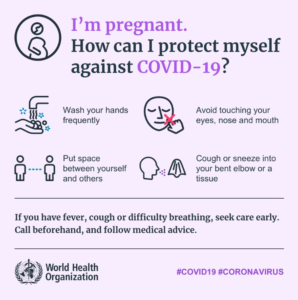This page is no longer being updated. For the most up-to-date information on COVID-19 in Macon County visit www.maconmohealth.org/covid19 or call our office at 660-395-4711.
COVID-19 and Pregnancy
The CDC states that pregnant people are at an increased risk of severe illness from COVID-19 than non-pregnant people. Additionally, there may be an increased risk of adverse pregnancy outcomes, such as preterm birth, among pregnant people with COVID-19.
Pregnant women experience immunologic and physiologic changes, making them more susceptible to viral respiratory infections, including COVID-19. Pregnant women also might be at risk for severe illness, morbidity, or mortality compared to the general population as observed in cases of other related coronavirus infections
Talk with your doctor about what to do if exposed to COVID-19 and what medications may be safe during pregnancy to relieve your symptoms.
Work with your doctor to determine any changes to prenatal care, appointments, and during labor and delivery. Continue to receive prenatal care.
The CDC, American College of Obstetricians and Gynecologistsexternaland the Society for Maternal-Fetal Medicine recommend receiving a COVID-19 vaccination if you are currently pregnant or planning to get pregnant. Research shows the COVID-19 does not cause infertility. Vaccination during pregnancy will build antibodies against COVID-19 that may help protect your newborn against COVID-19. If you have questions, talk with your OB/GYN for the best recommendations for you and your growing family.
The COVID-19 Vaccine is recommended to mothers who are breastfeeding.
https://www.who.int/news-room/q-a-detail/q-a-on-covid-19-pregnancy-childbirth-and-breastfeeding

